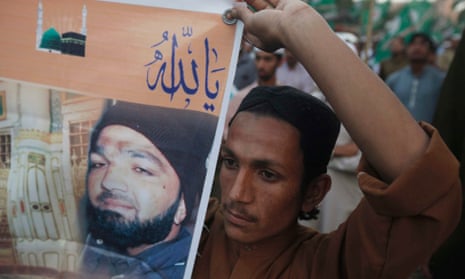Mudassir Khan visits the tomb of Ghazi Shaheed Ilm-Deen every day to add to the heap of flower petals on top of his grave and sing a tearful prayer to the illiterate carpenter’s apprentice who killed to protect the honour of his faith.
Like hundreds of others who come daily to the gaudily decorated enclosure in the middle of Lahore’s main graveyard, the restaurant owner reveres the 20-year-old executed for his crime more than 85 years ago.
“In the other shrines you have to pray for half an hour,” Khan said. “But here God answers our prayers in minutes.”
In a country bursting with shrines of saints honoured for their wisdom or righteousness, Ilm-Deen’s tomb is perhaps the only one where a framed copy of a murder charge takes pride of place next to the tomb.
It relates to events that happened before Pakistan came into existence but still resonate with many people who see parallels with the contemporary case of Mumtaz Qadri, the former police bodyguard who murdered one of Pakistan’s best-known politicians in the name of blasphemy in 2011.
The charge sheet details how on 6 April 1929, Ilm-Deen “brutally attacked” with a knife the Lahore-based publisher of Rangeela Rasool, a book that had enraged many Muslims with its scurrilous commentary on the life of the prophet Muhammad.
The “first investigation report” on the wall of the shrine says Mahashay Rajpal, the Hindu victim, had tried to defend himself by throwing piles of books at Ilm-Deen, who was soon arrested, still holding the murder weapon.
The killing turned the young man into a hero, earning him the honorifics Ghazi and Shaheed and ensuring he remained famous almost a century later, in part thanks to a popular film celebrating the incident.
Muhammad Ali Jinnah, the lawyer who would found the new state of Pakistan 18 years later, travelled from Mumbai, then known as Bombay, to Lahore to defend Ilm-Deen in his appeal hearing but was unable to save him from being hanged by the colonial government.
His funeral was attended by tens of thousands, including Muhammad Iqbal, Pakistan’s national poet, who gave a graveside eulogy.
The saga has particular resonance today among hardline Barelvis, Pakistan’s largest grouping of Sunni Muslims, not just because devotion to the prophet is central to their faith, but because they argue Qadri should also be regarded as a national hero.
This week Qadri took a step closer to becoming a modern day Ilm-Deen when Islamabad’s high court upheld his conviction for murder, a decision that predictably outraged the hundreds of demonstrators who have gathered outside the courthouse for each appeal hearing.
“In 1929 we could not stop the execution of the lover of the prophet because the British were in power and Muslims were a minority,” said Khadim Hussain Rizvi, a mullah who made the journey from Lahore just to protest. “Now there is a Muslim government in Pakistan and we will not obey our leaders if they execute Qadri.”
Qadri enjoys widespread support for his murder of Salmaan Taseer, the governor of Punjab province, because of the outrage Taseer sparked by his campaign to win a pardon for Asia Bibi, a poor Christian woman sentenced to death under Pakistan’s notorious blasphemy laws.
Although at least one popular mosque has been named after Qadri, he has a long way to go to match Ilm-Deen, whose name has been given to parks, roads, hospitals and even a government guesthouse in Islamabad.
Both the Ilm-Deen and Qadri cases touch on Pakistan’s perennial, and increasingly bitter, debate about the role of Islam in national affairs.
Abdul Majeed, a retired soldier turned mullah who runs a mosque near Ilm-Deen’s shrine, claimed the saga was one of the inspirations for the “two nation theory” later used to justify the partition of the subcontinent in 1947.
“It was one of the reasons for the Hindu-Muslim divide,” said Majeed, who has written a short history of Ilm-Deen called The Flower Who Sent a Blasphemer to Hell. “It made us realise we are separate nations.”
Liberal lawyer and historian Yasser Latif Hamdani said Jinnah only acted on the “cab-rank rule” to take a case for which, as one of India’s top barristers, he was paid a handsome fee.
But Hamdani conceded the involvement of educated members of the Muslim elite, such as Jinnah and Iqbal, was “a major failing”.
“It has allowed basically half-educated lawyers to get up and say Jinnah appeared in this case and now we’re doing this,” he said. “Pakistan has to divorce itself from this history because a society that makes heroes out of Ilm-Deen is likely to end up with murderers like Qadri.”
In an extraordinary twist the two killings span the generations of one family: Salmaan Taseer’s father, the celebrated Urdu poet Muhammad Din Taseer, was among Ilm-Deen’s supporters, helping raise funds for his defence and donating the shroud in which the carpenter was buried.
Almost a century later, his grandson, the artist Shaan Taseer, has emerged as a leading voice against religious extremism and formally petitioned the Islamabad high court to uphold the death sentence for his father’s killer.
He argues that the historical context of Qadri’s case is different from that of Ilm-Deen, who Taseer said was a rallying point for Muslim pride and Muslim interests in the late colonial period.
“Defending the interests of the Muslim community of India is not the same as fighting for Islam,” he said.
